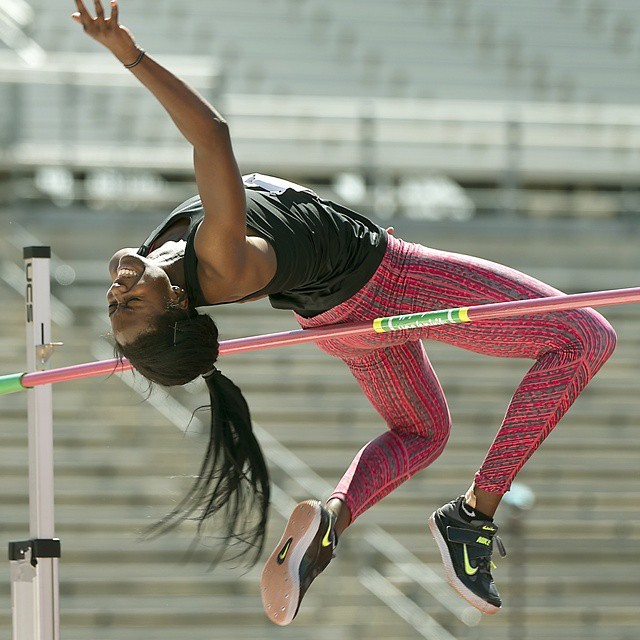Austin Olympic Hopefuls Won’t Let Zika Threaten Their Medal Dreams
By Aaron Schnautz
Reporting Texas

Sierra Patrick competes in the high jump in the women’s pentathlon at the Nike Clyde Littlefield Relays at the University of Texas in Austin on March 25, 2015. Photo courtesy Ralph Barrera/Austin American-Statesman
For Reporting Texas
Like many of the world’s top athletes, Sierra Patrick dreams of standing on the podium this August in Rio de Janeiro as an Olympics judge hangs a gold medal around her neck.
Her parents, both former Olympians, have been pushing her toward athletic greatness since she was a child. Her father, David, ran the 400-meter hurdles in the 1992 Barcelona Games, and her mother, Sandra, competed in three games, winning a silver medal in the 400 hurdles in Barcelona.
Sierra is not going to let fears of the Zika virus get in the way of her dream of qualifying for the U.S. team and making her mark in Rio.
“It’s not something I’m thinking about in training every day,” said Patrick, 21, a University of Texas at Austin corporate communications major who competes in the high jump and heptathlon. “It’s more that I’ll worry about it when it gets closer.”
With the games only a few months away and no vaccine in sight, some athletes are concerned about traveling to Brazil, where a mosquito-spread Zika outbreak that began about a year ago has affected 1.5 million residents. The World Health Organization has labeled the virus a global health emergency. The virus has been linked to serious birth defects, including microcephaly, causing high concern among some female athletes. Hope Solo, the starting goalkeeper of the U.S. women’s soccer team, suggested earlier this year she might not go because of Zika fears, but recently said she will compete.
Patrick said her training schedule keeps her too busy to be preoccupied with Zika. She trains six days a week with the UT track team and does workouts on her own on Sundays. Her training will intensify as the Olympic trials approach.
Morolake Akinosun, a 21-year-old UT-Austin exercise science senior and sprinter, said she’s not overly concerned about Zika.
“There’s a lot of other things that are wrong with the Rio Olympics right now,” she said. “The Zika virus is just something that is not very worrying to me.”
Among the problems Akinosun mentioned is that construction is behind schedule for the village where Olympic athletes will live, and that the bays and lagoons where some Olympic events will take place are so polluted with sewage that swimmers could become sick. Though efforts are underway to address those problems, Brazilian officials have said the efforts might not be complete before most athletes arrive in mid-July.
Akinosun, however, is confident the U.S. Olympic Committee will take care of its athletes. Having competed in the Pan American Games last year in Toronto, where she won a gold medal in the 4×100 meter relay, she knows how diligent the committee is about protecting and supporting American athletes.
“I’ve been on U.S. teams before, and the U.S. Olympic Committee will make sure all the athletes have clean drinking water and things of that nature,” she said.
Patrick said she shares that confidence.
“We’re very fortunate here in America to have the U.S. Olympic Committee, which has enough money to provide protection and information” about Zika,” she said.
This is not the first Olympics clouded by serious health concerns for athletes. A measles outbreak during the 2010 Winter Games in Vancouver affected 82 people. China struggled to combat severe air pollution ahead of the 2008 Summer Games in Beijing.
But Zika is an unusual threat, because it is so easily spread by a common insect and because of its links to severe birth defects. Brazil has reported more than 640 cases of microcephaly in the past year, leading the U.S. Centers for Disease Control to issue a travel advisory for women who are or plan to become pregnant and who are considering going to Latin and South American countries where the virus is prevalent.
Both the international and U.S. Olympic committees have told athletes they can skip the Games if they are concerned. But with Rio being the first South American host of the quadrennial competition, there are no plans to cancel the event, which runs from Aug. 5 to 21.
In Rio, the municipal health department has said it will step up efforts to control Zika with inspections to eliminate any standing water near competition areas and creating teams that will monitor all venues during the games.
Both Patrick and Akinosun still need to qualify for the U.S. team at the Olympic trials in July. By summer, there’s no telling how severe the Zika outbreak might be. Dr. Seema Yasmin, a professor of public health at the University of Texas at Dallas and journalist at The Dallas Morning News, said as more research and information become available, it will be easier for people to decide whether to travel to Zika-affected areas such as Brazil.
“Understanding risk is definitely not our strong point,” Yasmin said. “The Zika virus has lots of unknowns right now.”
However, the chance to stand on the gold medal podium while “The Star-Spangled Banner” is played outweighs the risk of contracting Zika for Patrick and Akinosun.
“I’m not pregnant, nor do I intend to be pregnant for like 10 years or so,” Akinosun said. “So it’s not worth something being in the way that I’m going to let it stop me from going to the Olympics. It’s been a lifelong dream for me to be there.”
Claudia Bueno of Reporting Texas Sports contributed to this article.